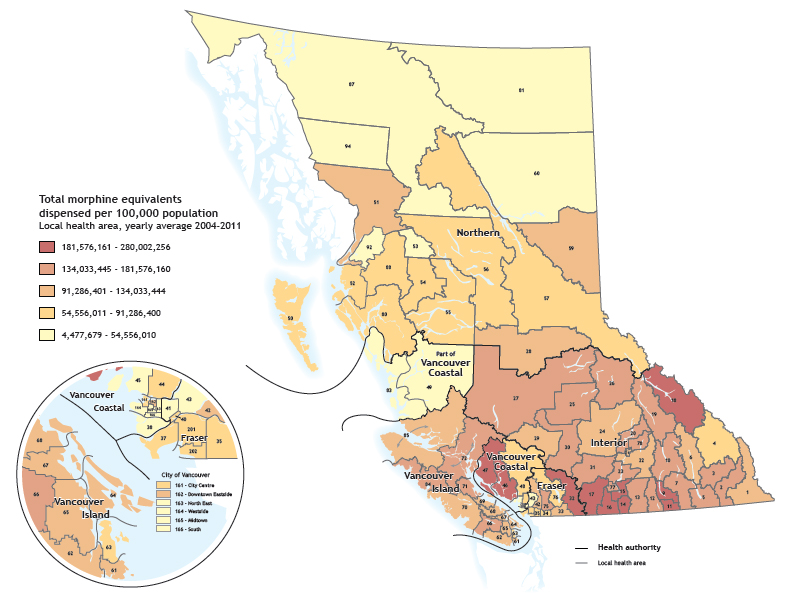
Opioid dispensation per capita across B.C. Numbers in legend indicate millgrams dispensed per capita, with darker regions indicating more dispensation.
Prescription opioids appear to be overprescribed in some regions of British Columbia, resulting in higher rates of overdose and death, according to a new study from the School of Population and Public Health.
UBC researchers found significant variation in prescription rates across 79 of the local health areas of B.C from 2004 to 2013, and that areas with the highest volumes of prescribed opioid purchases were also the areas that experience the most overdose deaths involving those drugs.
The study, published in Medical Care, also found that, on average, people who live in areas where more prescription opioids are purchased are not sicker than people who live in areas with low rates of opioid dispensing. The findings point to the need to change prescribing practices and monitor total sales of drugs like fentanyl, oxycodone, morphine, and hydromorphone.
“Our study shows that these prescription medicines are being used in ways that cause significant harm,” said Professor Steve Morgan. “Sometimes the harm is to the person for whom the prescription was written; other times, the harm is to people who appear to have borrowed, bought, or stolen these drugs. We need a solution that addresses both these issues.”
Dr. Morgan and his colleagues found that many British Columbians (nearly one-third of women and nearly two-thirds of men) who died from a prescribed opioid overdose did not fill a prescription for such medications in the year prior to their death, indicating that some prescriptions are being diverted to the illegal drug market.
The researchers calculated that if the higher rates of prescription opioid use in regions such as the southern Okanagan and Fraser Valley were brought down to the lower levels found in North Vancouver, West Vancouver or Richmond, approximately 30 deaths (23 men and 7 women) would have been avoided over the 10-year study period.
Opioid use in B.C. is high compared to the rest of the country but it has been stable for many years and appears better controlled in some areas of the province than others. Dr. Morgan believes this is a sign of hope and that we can save lives.
“With its world-class prescription databases and outstanding medical leaders, B.C. is in an excellent position to monitor prescription practices to avoid fraud and abuse and to improve the management of patients who unfortunately become addicted to opioids,” Dr. Morgan said. “With adequate investments in monitoring, surveillance, and clinical management, we can ensure that B.C. patients get the treatment they need without the harms.”